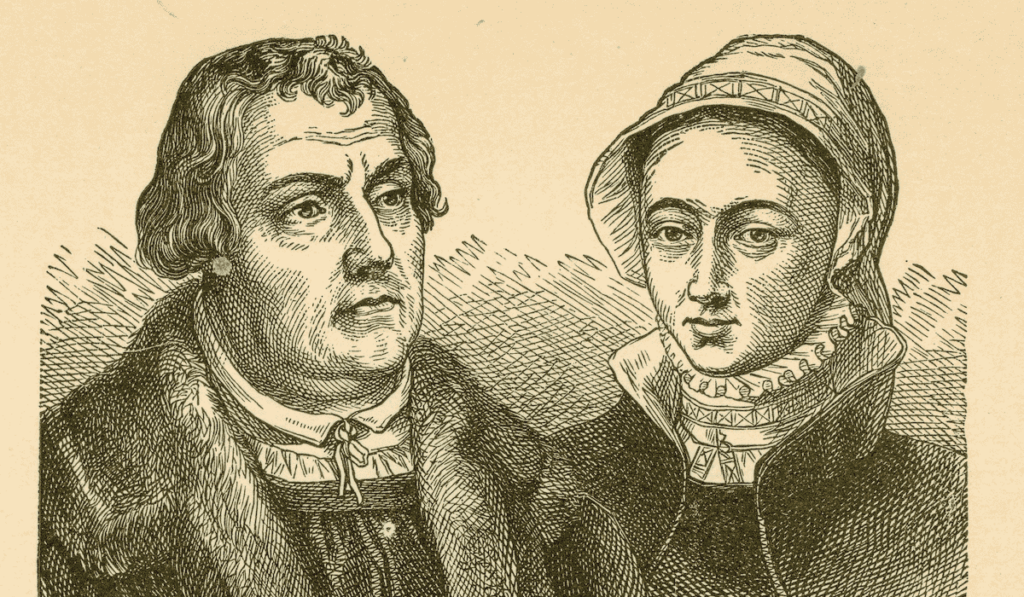by Rev. Michael Schuermann
König, Gustav Ferdinand Leopold. 1900. The life of Luther in forty-eight historical engravings. St. Louis: Concordia Publishing House.
In the recent documentary Martin Luther: The Idea That Changed the World, it’s put forward that the central question that drove Martin Luther into his discoveries in the Scriptures, and therefore his corrections and teaching, is how he (or anyone) can know that they are or be a “good person.” What this question is getting at, in simple terms, is how someone would know she is regarded by God as “righteous”; how he would have a clean or good conscience; how any human being would be confident in having salvation.
This was indeed Luther’s chief concern. It’s Luther’s chief concern because of his careful listening to the chief concern revealed to us in the Holy Scriptures, God’s Word: “None is righteous, no, not one…no one does good, not even one.” (Romans 3:10b, 12b) “For we hold that one is justified by faith apart from works of the law.” (Romans 3:28)
Yet Luther saw, through his own experience and through his observation of his fellow man in the Church and in the world, that this reality of fallen mankind is not intended to remain a purely philosophical principle. It is not only to be an idea put forth by Holy Scripture. Indeed, “may it not be!” (Romans 6:2a) Upon discovering this truth which answered the question, Luther also discovered that God intended this Good News to be proclaimed into all the world from the mouths of His Christians so that the intended change would happen: that lost and condemned sinners would be converted by the Gospel into believing, righteous, saved Christians.
In particular, true pastoral care was needed. In 1526, a visitation began to be conducted of the congregations in Saxony, in order to assess the pastoral care being given in the Christian parishes. Luther writes, in his preface to the Small Catechism, about what was discovered:
The deplorable, miserable condition that I discovered recently when I, too, was a visitor, has forced and urged me to prepare this catechism, or Christian doctrine, in this small, plain, simple form. Mercy! Dear God, what great misery I beheld! The common person, especially in the villages, has no knowledge whatever of Christian doctrine. And unfortunately, many pastors are completely unable and unqualified to teach…Therefore, I beg you all for God’s sake, my dear sirs and brethren, who are pastors or preachers, to devote yourselves heartily to your office. Have pity on the people who are entrusted to you and help us teach… (Concordia: The Lutheran Confessions, p. 313)
Through the Gospel our Lord Jesus Christ works faith in the hearts of men and causes them to be saved. This Luther realized and thus advocated for the tireless and ceaseless bringing of the Gospel to the people. This is pastoral care at its fundamental point. In the Smalcald Articles (Part III, Article IV), Luther spells out the various ways in which “God is super abundantly generous in his grace;” that is, the various pastoral means through which God brings the Gospel to the people. As a brief survey of Luther’s pastoral thought, let’s look at each part of Luther’s list and read a brief quotation from Luther’s writings about this point:
The Spoken Word: “For the Word created heaven and earth and all things; the Word must do this thing, and not we poor sinners. In short, I will preach it, teach it, write it, but I will constrain no man by force, for faith must come freely without compulsion. Take myself as an example. I opposed indulgences and all the papists, but never with force. I simply taught, preached, and wrote God’s Word; otherwise I did nothing. And while I slept, or drank Wittenberg beer with my friends Philip and Amsdorf, the Word so greatly weakened the papacy that no prince or emperor ever inflicted such losses upon it. I did nothing; the Word did everything.” (Luther’s Works, American Edition, vol. 51, p. 77)
Baptism: “Imagine there was a doctor somewhere who understood the art of saving people from death or, even though they died, could restore them quickly to life so that they would afterward live forever. Oh, how the world would pour in money like snow and rain. No one could find access to him because of the throng of the rich! But here in Baptism there is freely brought to everyone’s door such a treasure and medicine that it utterly destroys death and preserves all people alive. We must think this way about Baptism and make it profitable for ourselves. So when our sins and conscience oppress us, we strengthen ourselves and take comfort and say, ‘Nevertheless, I am baptized. And if I am baptized, it is promised to me that I shall be saved and have eternal life, both in soul and body.’” (Large Catechism, Part 4, 43-44)
König, Gustav Ferdinand Leopold. 1900. The life of Luther in forty-eight historical engravings. St. Louis: Concordia Publishing House, 119
The Holy Sacrament of the Altar: “With this Word you can strengthen your conscience and say, ‘If a hundred thousand devils, together with all fanatics, should rush forward, crying, ‘How can bread and wine be Christ’s body and blood?’ and such, I know that all spirits and scholars together are not as wise as is the Divine Majesty in His little finger’ Now here stands Christ’s Word, ‘Take, eat; this is My body.… Drink of it, all of you; this is My blood of the new testament,’ and so on. Here we stop to watch those who will call themselves His masters and make the matter different from what He has spoken. It is true, indeed, that if you take away the Word or regard the Sacrament without the words, you have nothing but mere bread and wine. But if the words remain with them, as they shall and must, then, by virtue of the words, it is truly Christ’s body and blood. What Christ’s lips say and speak, so it is. He can never lie or deceive.” (Large Catechism, Part 5, 12-14)
The Power of the Keys: “When I urge you to go to Confession, I am doing nothing else than urging you to be a Christian. If I have brought you to the point of being a Christian, I have thereby also brought you to Confession. For those who really desire to be true Christians, to be rid of their sins, and to have a cheerful conscience already possess the true hunger and thirst. They reach for the bread, just as Psalm 42:1 says of a hunted deer, burning in the heat with thirst, ‘As a deer pants for flowing streams, so pants my soul for You, O God.’ In other words, as a deer with anxious and trembling eagerness strains toward a fresh, flowing stream, so I yearn anxiously and tremblingly for God’s Word, Absolution, the Sacrament, and so forth. See that would be teaching right about Confession, and people could be given such a desire and love for it that they would come and run after us for it, more than we would like. Let the papists plague and torment themselves and others who pass up the treasure and exclude themselves from it. Let us, however, lift our hands in praise and thanksgiving to God for having graciously brought us to this our understanding of Confession.” (Concordia: The Lutheran Confessions, Appendix B, 32-35)
For more reading on Luther and his pastoral care, I recommend Luther: Letters of Spiritual Counsel, edited by Theodore G. Tappert, and John Pless’ Martin Luther: Preacher of the Cross.
The Rev. Michael Schuermann is pastor of Good Shepherd Lutheran Church, Sherman, Ill.

